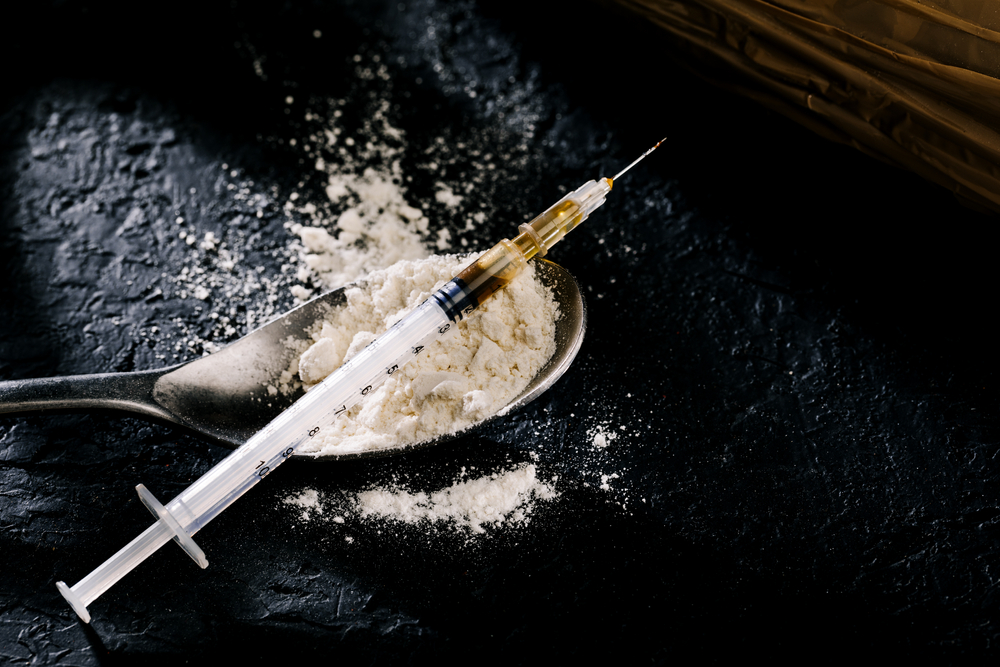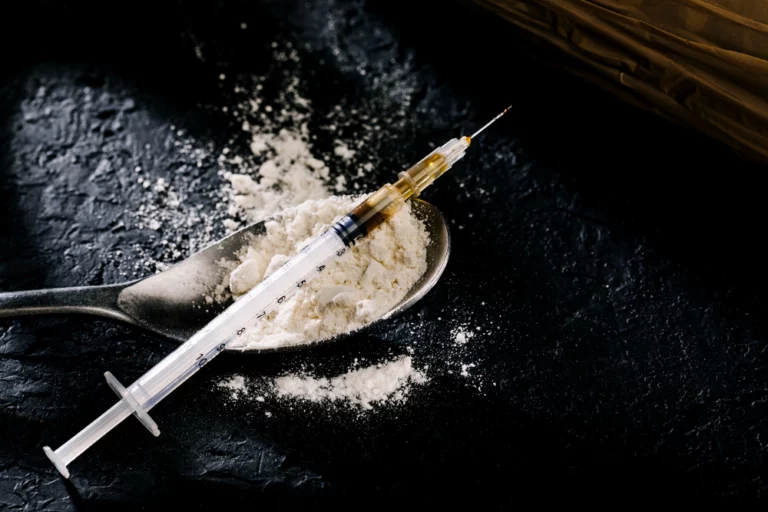“Upper” and “downer” are slang terms that refer to the way a substance affects the central nervous system. Most drugs fall into one of the two categories. Uppers, also known as stimulants, are drugs that increase energy and alertness. They also raise blood pressure and heart rate. In contrast, downers, also known as depressants, have a sedative effect on the brain and body. Downers decrease focus and alertness, and slow down breathing and heart rate.
With their opposing effects, both uppers and downers can be dangerous, and abusing either can be life-threatening. Health risks associated with uppers include cardiac distress, high blood pressure, and stroke, while downers increase risk of low blood pressure and respiratory failure. Continue reading to learn more about heroin, the many dangers of this drug, and whether or not it is an upper or downer.
Heroin is classified as a depressant, therefore it is a downer.
What is Heroin?
Heroin is an illegal and highly addictive opiate derived from morphine, which comes from the seedpod of the opium poppy plantAdditionally, it can lead to social problems, legal issues, and even death. Other names for heroin include “smack,” “junk,” “brown sugar,” “horse,” and “H.”. It is usually in the form of a white or brown powder or a dark, sticky material called “black tar heroin.” Heroin is usually injected, smoked, or snorted, giving the user a sense of euphoria and calmness. Nevertheless, it brings with it numerous risks and dangerous results, including overdose, dependence, and health issues. Additionally, it can lead to social and legal issues. or even death.

Is Heroin a Downer or an Upper?
Heroin is a central nervous system depressant, classifying it as a downer. As an opioid, heroin binds to opioid receptors* in the brain that then trigger the release of dopamine. This release of dopamine produces a euphoric and calming effect on the mind and body. Many heroin users continue to take the drug for this intense sense of euphoria and relief from pain, but with regular use, the brain becomes unable to produce dopamine on its own. Heroin users then start to depend on heroin to provide dopamine, and to avoid dopamine depletion. Now physically dependent on the drug, the cycle of addiction has begun.
*Opioid receptors (G protein-coupled receptors) mediate the body’s response to hormones, neurotransmitters, and drugs and are also involved in the sensory perception of vision, taste, and olfaction.
In 2019 alone, more than 14,000 people died from heroin overdoses in the United States. This number does not include fatal overdoses from all opioids—particularly synthetic opioids—which would put the total closer to 50,000.
Other Downer Drugs
Other CNS depressants drugs include:
- Benzodiazepines (Xanax, Valium, Ativan, Klonopin, Halcion, and Librium)
- Barbiturates (Phenobarbital, Secobarbital, Amytal, and Numbutal)
- Sedatives (Ambien and Lunesta)
- Methaqualone (Quaaludes)
- GHB
- Ketamine
- Alcohol
- Fentanyl
- Prescription painkillers
Does Heroin Have Any Stimulating Effects?
Heroin is a drug that depresses the central nervous system, causing brain activity to decrease and leading to a sense of calmness and elation. It is not usually thought of as a stimulant, which are substances that elevate the rate of neural activity and the heart rate, creating a feeling of vigor and wakefulness. Stimulants include drugs such as amphetamines and cocaine. It is possible, however, that users might have a stimulating outcome after the consumption of heroin, especially at high doses or when taken with other drugs. The effects of heroin can be hard to anticipate and differ from person to person and from one time to another.
Are Downers More Addictive Than Uppers?
It is undeniable that both stimulants and depressants have the potential to be addictive, each in their own fashion. The level of addiction is affected by the source of the drug, be it an illicit street drug or a medication prescribed by a healthcare professional. Drugs with no known ingredients (such as fentanyl or cocaine) often have a greater potential to be habit-forming as the users have no knowledge of what is contained within them.
It is impossible to provide a definitive answer to this question. Both kinds of drugs are hazardous and habit-forming and any medication taken without consulting a doctor can be hazardous. Even those drugs that are prescribed by a doctor, such as opioids or benzodiazepines, may still bring about risks. The risk of addiction is individual, depending on the person using the drug. Are they at greater risk for becoming addicted? Do they have a mental health issue? Have they used either kind of drug before? All these factors, taken together, will decide which drug is more likely to be addictive for that particular person, since there is no general answer.
What Happens If You Mix Downers With Uppers?
Mistakenly, people believe that combining different drugs will cancel out their effects. This may be done to counteract an accidental overdose of one drug or to achieve a desired mental state. Nonetheless, the physical and neurological effects of this behavior can be severe. Additionally, some individuals continue using the same drug or class of drug to avoid the negative effects of the comedown.
Imagine a situation where an individual begins using a downer to alleviate anxiety and induce relaxation. When their energy declines, they might take a stimulant to stay engaged in a social gathering or event. This pattern sets off a cycle that may result in excessive drug use and dramatically heightens the chances of a potentially lethal overdose. Here’s how combining downers with uppers can be fatal.
- Combining uppers and downers increases overdose risk: Stimulants can mask the effects of depressants, making it easier to take too much of a drug or exceed the body’s limits.
- Prolonged drug effects and toxic buildup: Both uppers and downers can slow the body’s metabolism, leading to longer drug effects and toxic buildup.
- Heart complications: Combining uppers and downers can strain the heart and increase the risk of irregular heartbeat and failure.
Why Is Heroin Addictive?
Heroin is highly addictive because it rapidly binds to opioid receptors and causes a surge of dopamine. This leads to the development of tolerance, meaning that users need to take higher doses of heroin to achieve the same effects. Over time, heroin use can cause physical dependence, withdrawal symptoms, and serious health problems, including respiratory depression, infections, and overdose.

How Heroin Affects The Body
The effects of heroin on an individual will vary depending on factors like their physical and psychological make-up, the quantity of heroin taken, possible interactions with other substances or medications, and if they have begun to build a tolerance to the drug.
Short-term effects of heroin use may include:
- Relief from physical pain
- Euphoric feelings
- Shallow breathing
- Sleepiness
- Drowsiness
- Lowered body temperature
- Nausea or vomiting
- Risk of overdose
Long-term effects of heroin use may include:
- Collapsed veins
- Chronic constipation
- Skin sores
- Extreme weight loss
- Increased risk of HIV and Hepatitis from sharing needles
- Decreased immunity
- Risk of overdose
Heroin Overdose
A heroin overdose is a serious and potentially fatal medical emergency, and it is essential to be knowledgeable of the signs so that one can seek medical aid straight away if it appears a person is going through an overdose. Various indicators and signs of a heroin overdose may include:
- Blue tint to lips and fingernails
- Shallow breathing
- Unconsciousness
- Confusion
- Weak pulse
- Seizures
- Chest pain
- Nausea
- Vomiting
- Drowsiness
- Nodding off
If an individual is displaying any of the symptoms of a heroin overdose, it is vital to summon emergency medical assistance right away. The application of naloxone, a drug that can reverse an overdose, could very well be the difference between life and death in this circumstance. Do not attempt to induce vomiting or take any other actions to treat the overdose yourself. Rapidly seek out medical help.

Treatment Options for Heroin Addiction
Different kinds of successful therapies for heroin use disorder exist, such as psychological and medication-based treatments. These treatments can help the brain and behavior to return to a regular state, which leads to higher employment and a decreased chance of HIV and other illnesses, as well as criminal conduct. Even though either kind of treatment can be useful on its own, research has demonstrated that for many individuals, combining both forms of treatment in a structured rehabilitation program is the most successful approach.
Medications and Detox
It has been established through scientific research that using medication to treat opioid addiction can increase the rate of people staying in treatment programs and reduce the amount of drug use, spread of infectious diseases, and criminal behavior. When someone dependent on opioids like heroin attempts to quit, they are likely to experience symptoms of withdrawal such as pain, diarrhea, nausea, and vomiting, which can be very intense.
Medicines can be beneficial in this detoxification process to reduce cravings and other physical side effects, which can often lead to somebody relapsing. The FDA has approved lofexidine, a non-opioid medication made to lessen withdrawal symptoms. Although it is not a cure for addiction, detoxification can be a helpful initial step when combined with a form of evidence-based treatment.
Therapy and Rehabilitation
There are a variety of successful treatment options available for opioid use disorder, and they can be provided in both outpatient and residential environments. Contingency management and cognitive-behavioral therapy have been demonstrated to be particularly effective when used in conjunction with medications for heroin use disorder.
Contingency management relies on a points-based system in which individuals are rewarded with vouchers for clean drug tests that can be exchanged for items promoting healthy behaviors. Cognitive-behavioral therapy is used to alter the patient’s mindset and behaviors with regards to drug use and to bolster their ability to manage life stressors. It is essential to pick the best treatment approach for meeting the individual needs of each patient.

Knoxville Recovery Center Can Help
Heroin abuse is very dangerous to the user if left untreated. Fortunately, help is available for those battling this addiction. Depending on the stage of an individual’s addiction, they may require detox, an intensive treatment program, or both. Fortunately, Knoxville Recovery Center offers various services to those struggling with this addiction.
Services offered:
Detox – Our on-site detox clinic accommodates and supports clients as the body sheds all residual traces of heroin. Clients are under medical supervision during the detox process to ensure that they remain safe and comfortable.
Addiction Treatment – During our addiction treatment program, clients will engage in introductory therapies and exercises that work to prepare them for continued, more intensive treatment outside of our facility. The goal of our addiction treatment track is to stabilize clients so that they are treatment-ready.
Mental Health Treatment – Our mental health treatment program introduces behavioral therapies rooted in self-expression and holistic exercise. Art therapy, music therapy, and yoga are just a few forms of therapy we offer at the center. Our goal is to help the client reclaim their voice and expose them to treatment within a professional facility.
Aftercare Planning – Aftercare is designed for individuals who have benefitted from our introductory addiction services and are transitioning into a more intensive addiction treatment program. Once a client is stabilized, they will be encouraged to pursue continued addiction treatment. Our experienced case managers will then work with our clients to place them in a program that addresses their specific wants and needs.
Addiction is difficult to overcome alone. If you feel that you or a loved one is struggling with heroin abuse, our specialists are on standby and ready to help. Call Knoxville Recovery Center and speak with an addiction expert today.








